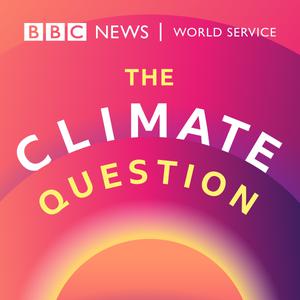
The Climate Question
BBC
A global programme that reflects the variety of takes on climate change, how best to understand it and the world’s attempts to avert it, temper it or adapt to it. It is not about questioning whether climate change is happening, it’s about finding the best ways to respond to it. This is sharp-edged, analytical inquiry. Hard scrutiny, touched with a sense of adventure and discovery, and where we can find it, hope. It includes stories from across the world on why we find it so hard to save our own planet, and how we might change that.
- 28 minutes 53 secondsBonus Ep: the climate activists who sued their government (and won)
In this extra episode, Graihagh Jackson hears from our friends on BBC podcast The Global Story about a case that could change the history of climate activism.
For nearly a decade, a group of elderly women argued that Switzerland’s weak climate policies violated their human rights. Their victory – the first of its kind in the European Court of Human Rights – sets a precedent 46 countries must now follow. The BBC's climate reporter, Georgina Rannard, has been covering the case for years. She shares the women’s personal stories with presenter James Reynolds, while climate lawyer Sophie Marjanac explains what it could mean for those seeking climate justice everywhere.
The Global Story brings you trusted insights from BBC journalists worldwide. They want your ideas, stories and experiences to help them understand and tell #TheGlobalStory. Email: [email protected] or message/leave a voice note via WhatsApp: +44 330 123 9480.
And remember you can also email your climate-related questions and comments to Graihagh and The Climate Question team at [email protected].
Production team for The Global Story: Laurie Kalus, Alix Pickles, Neal Razzell, Mike Regaard, Sergi Forcada Freixas, Sam Bonham.
26 April 2024, 5:09 pm - 26 minutes 28 secondsCan we save the world's coral?
Corals protect humans and sustain 25% of all marine life. But reefs are under threat from climate change, and mass bleaching events mean that some scientists estimate they could disappear by 2100.
In this episode, Graihagh Jackson is joined by BBC CrowdScience presenter, Caroline Steel. We go to Puerto Rico to see how self-duplicating, carnivorous coral could be the solution. We also speak to the scientist who helped discover what was causing coral bleaching in the first place - back when climate change was commonly denied.
Guests: Dr Ove Hoegh-Guldberg, Professor of Marine Studies at the University of Queensland in Brisbane Dr Stacey Williams, Executive Director at the Institute for Socio Ecological Research
Presenters: Graihagh Jackson and Caroline Steel Producer: Octavia Woodward Production co-ordinator: Brenda Brown Editor: Simon Watts Sound Engineer: Tom Brignell
Got a climate question you’d like answered? E-mail the team: [email protected]
22 April 2024, 9:06 am - 26 minutes 28 secondsCan fertilisers go green?
Ammonia has revolutionised the way we produce our food, helping us to grow much, much more... But it’s also helping to grow global greenhouse gas emissions too.
Synthetic fertilisers are actually responsible for around 5% of the planet-warming gases going into the air - that’s more than deforestation.
In this episode, Graihagh Jackson examines this challenge that modern agriculture poses to the climate, and finds out whether it’s possible to cut emissions from fertiliser use without cutting food production at the same time. She’ll also be joined by local reporters in Kenya to hear about innovative projects aiming to tackle this problem and turn farming green.
Do you have a climate question you’d like answered? E-mail us: [email protected]
Presenter: Graihagh Jackson Reporters in Kenya: Michael Kaloki and James Gitaka Producer: Ben Cooper Researcher: Octavia Woodward Production co-ordinator: Brenda Brown Sound engineer: Tom Brignell Editors: Simon Watts and Sophie Eastaugh
16 April 2024, 5:30 am - 27 minutes 2 secondsWhy are electric scooters, mopeds and rickshaws booming?
Delhi’s roads are being taken over by electric mopeds, scooters and rickshaws. More than fifty per cent of two- and three-wheelers are already electric, and the market is expected to continue growing. It’s good news for the fight against climate change. Why has the transition to green vehicles been so swift in India and what can the rest of the world learn from it?
Graihagh Jackson speaks to reporter Sushmita Pathak, who’s been chatting to those who’ve made the switch to electric as well as those who haven’t. Akshima Ghate from the RMI Foundation and Louise Ribet of C40 cities explain why these small vehicles are so popular and what countries like India and others gain from encouraging electric uptake. From better air quality and healthier children to energy security and manufacturing expertise, there are many benefits beyond mitigating climate change.
Presenter: Graihagh Jackson Producer: Ben Cooper Researcher: Octavia Woodward Editors: Sophie Eastaugh and Simon Watts Sound Engineer: Tom Brignell Production Co-Ordinator: Brenda Brown
Got a question you’d like us to answer? Send an email to: [email protected]
7 April 2024, 1:32 pm - 27 minutes 2 secondsHow is climate change affecting animal migration?
Every year, the great migration sees hundreds of thousands of wildebeest, gazelles, zebras and antelopes migrate from the Serengeti plains in Tanzania to the Maasai Mara in Kenya, in search of water and juicy grass. But rising temperatures and unpredictable weather are changing this epic animal journey dramatically. It’s the same for great white sharks, which are being spotted in areas where they’d never normally live.
Tanzanian safari guide Neema Amos takes us into the Serengeti to explain why the wildebeest migration is so important. And shark expert Trisha Atwood reveals how these changes affect not just the animals, but our fight against climate change itself.
Presenter Sophie Eastaugh is joined by:
Neema Amos, Safari Guide in Tanzania
Trisha Atwood, Associate Professor of Watershed Sciences at Utah State University
Joseph Ogutu, Senior Statistician at University of Hohenheim
Email us at [email protected]
Producers: Sophie Eastaugh and Octavia Woodward Editors: Graihagh Jackson and Tom Bigwood
Series Producer: Simon Watts Sound design and mixing: Tom Brignell Production Coordinator: Brenda Brown
Archive from the Sir David Attenborough programme, ‘Wildebeest: The Super Herd’, BBC Two, 2008
31 March 2024, 3:38 pm - 26 minutes 58 secondsHow does extreme heat affect pregnant women?
The BBC’s Global Health Correspondent Tulip Mazumdar investigates how extreme heat fuelled by climate change is affecting pregnant women in India. New research shared with the BBC suggests that pregnant informal workers in Tamil Nadu who were exposed to high temperatures saw double the risk of stillbirth, premature birth, low birth weight and miscarriage.
Discussing her reporting from India with The Climate Question host and fellow mum Graihagh Jackson, Tulip hears the heart-breaking stories of women affected and explores simple solutions that would make their work in scorching agricultural fields safer.
Email us at [email protected] Produced by Sophie Eastaugh, Graihagh Jackson and Camilla Horrox Editor: Sophie Eastaugh Sound Engineer: Tom Brignell Production Coordinator: Brenda Brown
21 March 2024, 12:01 am - 27 minutes 12 secondsYour questions answered: Reversing climate change, eating avocados, electric vehicles and more
You asked, we answered. This week our expert panel dive into your questions. Can climate change cause earthquakes and volcanic eruptions? How bad are avocados for the environment? Is climate change reversible?
Send your questions to: [email protected] Plus, a look at biofuels and vertical farming, China’s electric vehicle boom, and the apparent contradiction between more renewable energy and the continuing rise in planet-warming gases Join Graihagh Jackson and our expert panel: Dr Akshat Rathi, senior reporter for climate, Bloomberg; Justin Rowlatt, climate editor, BBC News; Prof Tamsin Edwards, climate scientist, Kings College London.
17 March 2024, 2:32 pm - 23 minutes 49 secondsWhat's it like living a "sustainable" life?
As governments and industry find ways of reducing emissions to keep climate change under control, some people are taking responsibility for their own carbon footprints.
In this episode, Graihagh Jackson explores some different ways of living a green life – from setting up an eco-friendly commune in Denmark, to making small adjustments to our lifestyles in cities such as London. Graihagh also talks to one of the UN's top experts on the social aspects of fighting climate change: what's the right balance between action by individuals and action by governments?
Presenter: Graihagh Jackson Producers: Ben Cooper and Sophie Eastaugh Researcher: Octavia Woodward Production co-ordinator: Brenda Brown Editor: Simon Watts Sound Engineer: Tom Brignell
Got a climate question you’d like answered? E-mail the team: [email protected]
10 March 2024, 2:32 pm - 23 minutes 54 secondsWhat's it like being a 'Chief Heat Officer'?
As climate change makes the world hotter, some cities have appointed "Chief Heat Officers" to try to improve their response to record-breaking temperatures. Graihagh Jackson speaks to two women who have done the job in Freetown, Sierra Leone, and Monterrey, Mexico. What does their role involve? What solutions are out there? And do they get enough funding?
Plus, Umaru Fofana reports from Freetown on the extreme heat gripping the city. Umaru talks to locals forced to sleep outside because of the temperature, despite risks to their health and safety. And he also investigates a new piece of building design that might help people living in informal settlements. Presenter: Graihagh Jackson Reporter in Sierra Leone: Umaru Fofana Producer: Osman Iqbal Researcher: Octavia Woodward Editor: Simon Watts Sound Engineers: James Beard and Tom Brignell
3 March 2024, 2:32 pm - 27 minutes 25 secondsCould solar farms in space power Earth?
It may sound like the stuff of science fiction, but the idea of assembling giant solar farms in space and then beaming the renewable energy back down to Earth is gaining real life traction. Some advocates have claimed it could supply all the world’s energy needs by 2050.
But how would these solar farms be assembled, how much fuel and money would it take to blast them into space in the first place, and how would we safely beam their energy back to Earth?
In 2023, Sophie Eastaugh and Luke Jones spoke to Sanjay Vijendran, in charge of space-based solar at the European Space Agency, learn about the history of the idea from Rick Tumlinson, founder of SpaceFund, and hear words of caution from Dr Jovana Radulovic, head of mechanical and design engineering at Portsmouth University in the UK. Plus, French astronaut Thomas Pesquet describes life on the International Space Station and how it’s powered.
Thanks to the Space Studies Institute for extracts of their interview with Gerard O’Neill.
Let us know what you think about the show – email [email protected]
Producer: Simon Tulett Researchers: Matt Toulson and Graihagh Jackson Series Producer: Alex Lewis Editor: China Collins Sound engineer: Tom Brignell Production Coordinator - Siobhan Reed
28 February 2024, 9:00 am - 24 minutes 40 secondsDo we need a 'Category 6' for hurricanes?
Graihagh chats to the BBC World Service's Global Story podcast about a plan for a super-category for storms. Is climate change making them so powerful that we need a new grade?
23 February 2024, 4:14 pm - More Episodes? Get the App
Your feedback is valuable to us. Should you encounter any bugs, glitches, lack of functionality or other problems, please email us on [email protected] or join Moon.FM Telegram Group where you can talk directly to the dev team who are happy to answer any queries.
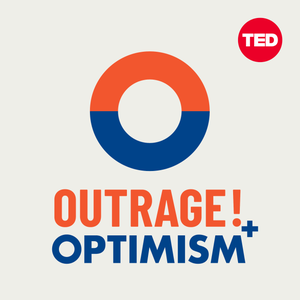 Outrage + Optimism
Outrage + Optimism
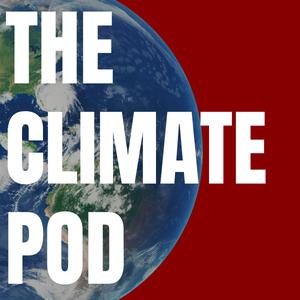 The Climate Pod
The Climate Pod
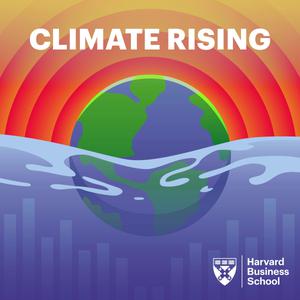 Climate Rising
Climate Rising
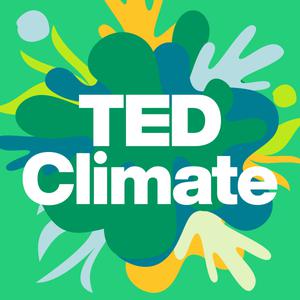 TED Climate
TED Climate
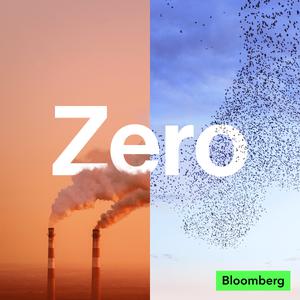 Zero: The Climate Race
Zero: The Climate Race
 Climate One
Climate One